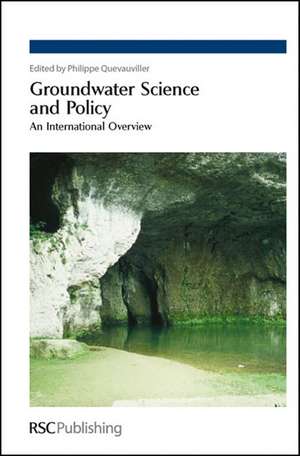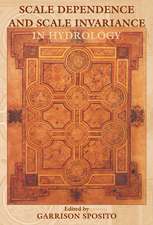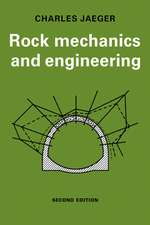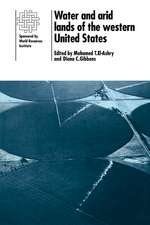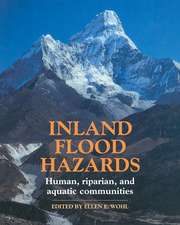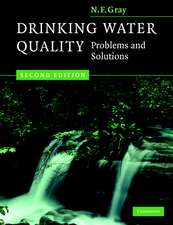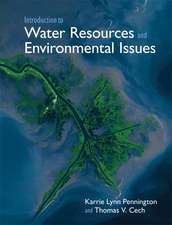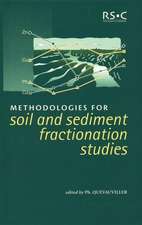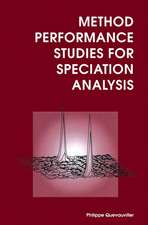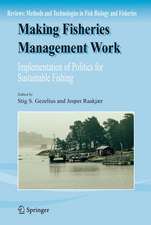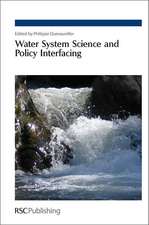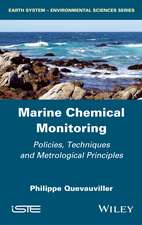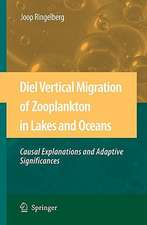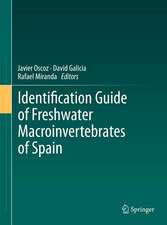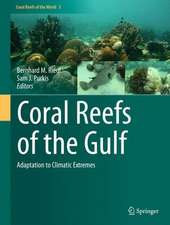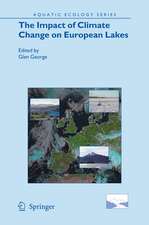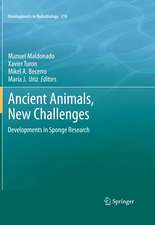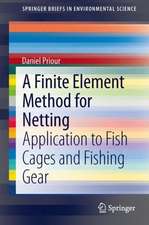Groundwater Science and Policy: An International Overview
Editat de Philippe Quevauvilleren Limba Engleză Hardback – 30 sep 2007
Until recently, focus on groundwater mainly concerned its use as drinking water and as an important resource for industry (e.g. cooling waters) and agriculture (irrigation). It has, however, become increasingly obvious that groundwater should not only be viewed as a drinking water reservoir, but that it should also be protected for its environmental value. In this respect, groundwater represents an important link of the hydrological cycle through the maintenance of wetlands and river flows, acting as a buffer through dry periods. Hence, deterioration of groundwater quality may directly affect other related aquatic and terrestrial ecosystems. The groundwater legislative framework under the EU Water Framework Directive and the newly adopted Groundwater Directive establishes criteria linked to environmental objectives which have to be met by 2015 following successive operational steps including characterisation, risk assessment (analysis of pressures and impacts), monitoring and design of programmes of measures. These milestones require that sound technical and scientific information be made accessible to water managers, which is so far still not sufficiently streamlined. In this context, this book describes the groundwater legislative milestones and presents series of research and development activities that aim to directly support them. It has, therefore, the ambition to become a vehicle liaising policy requirements and available scientific knowledge in this area.
Preț: 2168.26 lei
Preț vechi: 2521.23 lei
-14% Nou
Puncte Express: 3252
Preț estimativ în valută:
414.88€ • 433.22$ • 342.60£
414.88€ • 433.22$ • 342.60£
Carte tipărită la comandă
Livrare economică 15-29 aprilie
Preluare comenzi: 021 569.72.76
Specificații
ISBN-13: 9780854042944
ISBN-10: 0854042946
Pagini: 754
Ilustrații: 1
Dimensiuni: 166 x 241 x 47 mm
Greutate: 1.35 kg
Editura: Royal Society Of Chemistry
ISBN-10: 0854042946
Pagini: 754
Ilustrații: 1
Dimensiuni: 166 x 241 x 47 mm
Greutate: 1.35 kg
Editura: Royal Society Of Chemistry
Cuprins
Foreword: Preface: 1. General introduction: The need to protect groundwater; 2. Science-policy integration needs; 2.1. Science-policy integration for common approaches linked to groundwater management in Europe; 2.2. Transferring scientific knowledge to societal use: clue from the AQUATERRA integrated project; 2.3. Groundwater management and planning: how can economics help?; 3. Groundwater regulatory framework; 3.1. EU Groundwater policy; 3.2. US Drinking Water Regulation: Overview of the Ground Water Rule; 4. Stakeholder's interactions; 4.1. Principles of the Common Implementation Strategy of the WFD - The WG Groundwater; 4.2. The Pilot River Basin network - examples of groundwater-related activities; 4.3. The HarmoniCA initiative; 4.4. Linking public participation to adaptive management; 5. Groundwater characterization and risk assessment; 5.1. Groundwater characterization and risk assessment in the context of the EU Water Framework Directive; 5.2. Groundwater quality background levels; 5.3. Groundwater age and water quality vulnerability; 5.4. Characterization of groundwater contamination and natural attenuation potential at multiple scales; 5.5. Improved risk assessment of contaminant spreading in fractured underground reservoirs; 5.6. Groundwater risk assessment at contaminated sites (GRACOS): Test methods and modeling approaches; 5.7. INCORE - Integrated concept for groundwater remediation; 6. Groundwater monitoring; 6.1. Groundwater monitoring in the policy context; 6.2. Screening methods for groundwater monitoring; 6.3. Quality assurance for groundwater monitoring; 7. Groundwater pollution prevention and remediation; 7.1. Prevention and reduction of pollution of groundwater pollution at contaminated megasites: integrated management strategy, and its application on megasite cases; 7.2. Forecasting natural attenuation as risk-based groundwater remediation strategy; 7.3. Diffuse groundwater quality impacts from agricultural land-use - Management and policy implications of scientific realities; 8. Integrated river basin management; 8.1. IWRM principles for groundwater in the WFD context; 8.2. System approach to environmentally acceptable farming; 8.3. WATCH - Water catchment areas: Tools for management and control of hazardous compounds; 9. Groundwater status assessment; 9.1. Methodology for the establishment of groundwater quality standards; 9.2. Pesticides in European Groundwaters: biogeochemical processes, contamination status and results from a case study; 9.3. Evaluation of the quantitative status of groundwater-surface water interaction at a national scale; 10. Modeling; 10.1. Conceptual models in river basin management; 10.2. Modeling reactive transport of diffuse contaminants: identifying the groundwater contribution to surface water quality; 11. Conclusions - Further policy and research needs; 11.1. SNOWMAN - An alternative for transnational research funding; 11.2. Groundwater ecosystems research & policy needs; 11.3. Towards a science-policy interface (WISE-RTD) in support of groundwater management and its links to EU-research funding programmes; 12. Appendices; Appendix I - Outline of Water Framework Directive; Appendix II - Outline of Groundwater Directive
Notă biografică
Philippe QUEVAUVILLER is a member of the Water & Marine Unit of the EC Environment Directorate-General where he is responsible for the development and implementation of a new Groundwater Directive which will complement the existing water policy framework. He has worked as a researcher in marine geochemistry for over 20 years during which he has published more than 200 papers in the international literature and several books linked to environmental quality measurements. He is also a part-time professor at the K.U. Leuven teaching "water quality and treatment".
Textul de pe ultima copertă
Groundwater is a vital link in the hydrological cycle and the importance of its preservation and protection has been recognised in the newly adopted EU Ground Water Directive. This book offers a scientific overview of key findings in groundwater management set in context against the legislative milestones ensuing as a result of research and development activities. Highlighting the close relationship between policy requirements and scientific knowledge, the editor provides up-to-date information on the EU groundwater policy framework complimented with discussions on how integrating R&D activity and output into policy implementation can be approached. The first of its kind, this book is essentially a unique summary of outstanding research and development projects in the field of groundwater science which allows the reader to draw upon a wealth of knowledge and information from both a scientific and policy driven perspective. Examples of existing research projects contributing to both policy development and implementation are provided and discussed providing a very powerful point of reference for future decision and policy makers. This book will be of exceptional interest to all graduates, researchers and professionals working in the fields of environmental science, conservation science, pollution science, quality assurance and agricultural science.
Descriere
This book offers a scientific overview of key findings in groundwater management set in context against the legislative milestones ensuing as a result of research and development activities.
